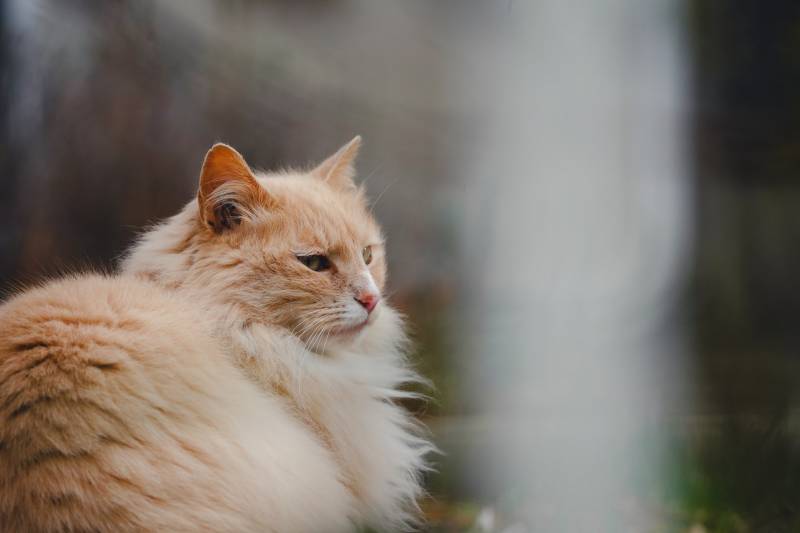Quick Navigation
- What Does a Lethargic Cat Look Like?
- 7 Reasons Why Your Cat Is Staring Off Into Space
- What To Do If Your Cat Is Staring Off Into Space?
- 1. Reduce Disorientation
- 2. Spray Your Home With Peppermint Oil
- 3. Use A Mirror To Refocus Their Attention
- 4. Play Music When Staring Occurs
- 5. Give Them Something Else To Focus On
- 6. Make Sure There Is Nothing In Front of Them That Will Distract Them
- 7. Offer Food And Water Regularly
- 8. Consider Using Pet Safe Medications
- 9. Consult A Psychologist If Necessary
- Final Thoughts
Cats are known for their independent nature and love of independence, and some may find their cat staring off into space lethargic.
They also tend to be lazy and prefer to spend their days sleeping and watching TV rather than interacting with other animals or people.

What Does a Lethargic Cat Look Like?
Normally, cats sleep a lot during the day.
According to a research on behavioral changes in cats, they sleep about 12 to 18 hours per day.
And from the same study, there is a significant relationship between aging and the time cats spend sleeping.
It goes to say that older cats tend to sleep more.
Older cats also tend to engage in lesser outdoor activities and choose to spend more time indoors.
But if your cat is still young and does nothing else but sleep, it shows signs of lethargy.
Lethargic cats are mostly unresponsive to stimuli.
If your cat is used to being playful whenever you bring it outside, you’d probably worry if it doesn’t anymore.
Or if you bring out a bowl of cat food and your cat simply dismisses you and goes back to sleep, and it hasn’t eaten at all, then you’re certain that something is wrong with your cat.
If your cat is suddenly lethargic and stares off into space, it could be because they are sick, stressed out, or bored.
If your cat is acting strangely, there could be several reasons behind it.
7 Reasons Why Your Cat Is Staring Off Into Space
1. Depression
Depression is another possible explanation for why your cat is lethargic and staring into space.
There are several ways that depression manifests itself in cats.
One way is through a lack of appetite.
Another way is through changes in sleep patterns.
Some depressed cats don’t seem interested in anything anymore.
Others show no interest in eating or drinking.
Still, others only eat once every few days.
These behaviors can last anywhere from one day up to two weeks.
2. Illness
A common reason why cats stare into space lethargically is due to feline infectious peritonitis (FIP).
FIP is caused by a virus called feline enteric coronavirus (FECV).
FECV infects most domestic felids, including dogs and ferrets.
In addition to causing diarrhea, vomiting, fever, weight loss, and abdominal pain, infected cats sometimes develop neurological signs such as head tilt, circling behavior, seizures, blindness, paralysis, coma, and death.
3. Your Cat Could Have Dysautonomia
If your cat staring into space is becoming extreme, he could have dysautonomia.
This condition makes felines lose control of their neurologic abilities and reflexes.
It is common in kittens but can occur at any age but is most common in your kitties.
Dysautonomia can also affect the cat’s pupils, respiration, digestive system, heart rate, salivary glands, and urine.
On the untrained eyes, this can be mistaken as rabies.
There are some symptoms to distinguish between dysautonomia and rabies:
- Anorexia and weight loss
- Unresponsive and dilated pupils
- Staring into space
- Elevation of the third eyelids
- Dribbling urine
- Dyspnea
- Dilated pupils
- Diarrhea breathing difficulty
Symptoms will start to worsen on day three or four.
If you notice most of these symptoms in a cat, you should immediately take it to the vet.
4. Your Cat Has Hyperesthesia
Feline Hyperesthesia Syndrome, or FHS, can cause severe and dramatic changes in a cat’s behavior that some owners swear their poor cat is possessed.
It can affect cats of all ages, but it usually appears for the first time in afflicted cats between 1 and 5 years.
The pattern of symptoms involves tail twitching, pupil enlargement, abnormal meowing, skin roll out, and staring off into space.
Contact your vet immediately if you notice this unusual symptom in your cat.
5. Confusion And Spatial Disorientation
It is a cognitive dysfunction in cats.
Usually, cats with cognitive dysfunction get lost in familiar places, fixate on objects, stare off into space, wander about, or get stuck and can’t navigate obstacles.
Disorientation is often the first sign that pet parents recognize as cognitive decline in their older cats.
It’s estimated that disorientation occurs in at least 40% of cats aged 17 years.
When your cat reaches an advanced stage, its cognitive functions deteriorate.
Often older cats seem lost in thoughts and can stare off into space, fixating on an object.
There’s nothing much you can do here as it is a natural course.
But you can consult your vet to know the best way to handle your cat’s declining cognitive functions.
6. Cats May Be Bored Or Lonely
If you’ve ever been around a cat who stares off into space, then you know that it can look pretty miserable when doing so.
It could also be because your cat doesn’t like being held and wants to get away from the person holding them.
Also, Boredom can lead to boredom-related behavior, such as pacing around the house or just sitting quietly by himself and staring off.
Sometimes, if your cat feels too much pressure at home, it may become restless and want to go outside.
7. Separation Anxiety
Separation anxiety occurs when pets don’t know how to cope without human contact.
When we leave our homes, pets experience separation anxiety and act withdrawn or stare at nothing in particular.
Also, when your cat moves to another environment, whether moving to a new apartment or going through a lifestyle change, it can be difficult for them to adjust.
So if you’re staring off into space lethargically, he’s trying hard to cope with the new environment.

What To Do If Your Cat Is Staring Off Into Space?
Cats staring off into space is a common behavior observed since the beginning of time.
Some people think it’s cute, while others find it annoying.
If your cat is staring off into space lethargically, here is what you should do:
1. Reduce Disorientation
Avoid changes to your cat’s food, food placement, litter, and litter box placement to reduce disorientation.
Try to keep her daily routine as consistent as possible.
2. Spray Your Home With Peppermint Oil
Peppermint oil, also known as menthol, is a great option to stop cats from staring off into space.
It works by masking their sense of smell, so they don’t see what you’ve cooked up in the kitchen.
3. Use A Mirror To Refocus Their Attention
A mirror will allow them to see themselves without looking directly at you.
If you have one available, place it where they’ll notice it first thing in the morning.
They may not even realize why they are staring until they start seeing themselves every day.
4. Play Music When Staring Occurs
Music helps distract us from our thoughts.
Playing music during stress can lower blood pressure and reduce heart rate.
So, playing music could work wonders on felines staring off into space too!
5. Give Them Something Else To Focus On
Try giving them toys that require concentration, such as puzzles or balls.
These toys will give them something else to focus on other than staring into space.
6. Make Sure There Is Nothing In Front of Them That Will Distract Them
Cats often stare because nothing is interesting going on around them.
Keep all distractions out of sight, including TVs, computers, phones, etc.
7. Offer Food And Water Regularly
Providing water and food regularly throughout the day will encourage your kitty to interact with you instead of staring blankly into space.
Cats need regular meals and access to clean drinking water to remain healthy.
8. Consider Using Pet Safe Medications
There are medications specifically designed to treat anxiety disorders in animals.
Many vets recommend anti-anxiety medication to prevent your pet from becoming anxious about being stared at.
9. Consult A Psychologist If Necessary
Some mental illnesses can affect your cat’s ability to behave normally.
A trained animal counselor can teach you how to recognize these signs and what steps to take to treat them.
Final Thoughts
So, what does it mean when your cat stares off into space?
Well, it means that something isn’t right.
But rest assured most times, it’s not anything serious.
Remember to take note of your cat’s behaviors and seek medical assistance immediately.

A passionate content creator on pet behavior, nutrition choices, and health, Mike is an experienced pet expert. He has been writing on multiple websites to compensate for his passion for cats. Mike grieves around plenty of pets in his parents’ house. At the start of his career, he had a sturdy intention to be a part of pet care by any means.
With his affiliation to Purrfect n’ Pawesome, he found a way to satiate his craving to participate in pet health, wellness, and behavior analysis. He has been a significant part of our team and a major contributor in equipping our site with useful, authentic, and research-backed articles.
“I love pets as much as I love to travel to explore multiple places and lifestyles. I have been attached to this pawsome platform for many years, and my experience regarding pets has enhanced significantly by using various devices to write articles. I believe in writing my thoughts and experiences, so I try to write down the experience and learnings for my readers no matter where I am and what my mood is.”




![Why Does My Cat Lay On Me All Of A Sudden? [ 7 Reasons] Why Does My Cat Lay On Me All Of A Sudden? [ 7 Reasons]](https://purrfectnpawesome.com/wp-content/uploads/2021/01/Why-Does-My-Cat-Lay-on-Me-All-of-a-Sudden-150x150.jpg)

